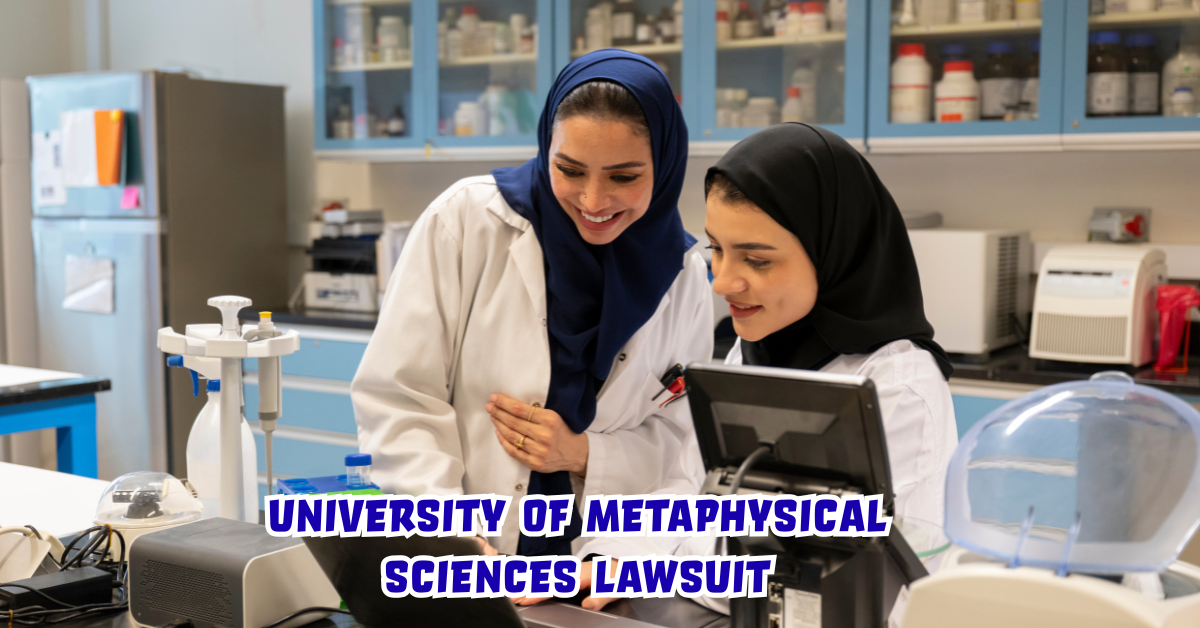When the term University of Metaphysical Sciences lawsuit appears, it naturally raises curiosity — not merely about the legal conflict but about what such an event reveals regarding spiritual education in modern times. Within the first hundred words, it is essential to clarify what’s at stake. The University of Metaphysical Sciences, known for its distance learning programs in spiritual development, holistic healing, and metaphysical philosophy, found itself entangled in legal proceedings that questioned the legitimacy of its credentials, its educational model, and the integrity of its operations. This case has become a lens through which broader questions are being asked — about alternative education, recognition of spiritual degrees, and how the law interprets unconventional belief-based institutions.
This article explores those intricate dimensions — the background, the allegations, the response, and the philosophical undercurrents. It provides an in-depth, 3,000-word analytical perspective written in The New York Times-style narrative, with factual neutrality, thoughtful structure, and critical insight.
The Context: A Rising Interest in Metaphysical Education
The University of Metaphysical Sciences (UMS) was founded with the aim of providing structured education in metaphysics — a field exploring consciousness, spirituality, and the unseen dimensions of existence. Students often pursue degrees to become counselors, spiritual teachers, or life coaches. In a world increasingly drawn toward mindfulness, meditation, and holistic healing, such an institution attracts those seeking meaning beyond the tangible.
However, the modern education system is built upon accreditation, licensing, and standardized evaluation — terms often foreign to metaphysical studies. The lawsuit against UMS brought into question whether such schools should be allowed to grant “degrees,” and what legal, academic, and ethical boundaries define “education” in a spiritual domain.
The case thus became larger than one institution — it sparked debate about the very nature of knowledge and the tension between spiritual autonomy and legal regulation.
The Lawsuit: Allegations and Core Issues
While every lawsuit unfolds with its unique specifics, the dispute involving the University of Metaphysical Sciences revolved around a set of recurring concerns. At its heart, it questioned how educational legitimacy should be determined when metaphysical concepts lie beyond empirical verification.
The key allegations included:
| Category | Details |
|---|---|
| Accreditation Concerns | Questions about whether UMS’s degrees meet the criteria recognized by official educational bodies. |
| Consumer Transparency | Claims that students were not adequately informed about the non-accredited status of their degrees. |
| Use of Academic Titles | Legal issues regarding graduates using the title “Doctor” or “PhD” in professional contexts. |
| Financial Disputes | Some claims involved refunds, course payments, or misleading representations of outcomes. |
| Free Speech and Belief | Counterarguments that such restrictions limit spiritual expression and freedom of belief. |
The lawsuit was therefore not just a bureaucratic dispute — it was a philosophical crossroads between faith-based education and the legal definitions of professional qualification.
Accreditation and Recognition: The Crux of the Conflict
To understand why such lawsuits arise, one must first understand what accreditation means. Accreditation is a process where an educational institution is evaluated and approved by a recognized body to ensure that it meets certain academic and administrative standards.
However, metaphysical sciences are not traditionally part of standardized education systems. Their essence lies in subjective experience — intuition, spirituality, and consciousness — which are inherently difficult to quantify or validate using academic metrics.
UMS, like several other metaphysical institutions, operates under religious or spiritual exemptions. It grants degrees legally, but those degrees are not recognized by the U.S. Department of Education or mainstream accrediting agencies.
That creates a gray area: while the university operates within its legal rights, misunderstandings occur when students expect their degrees to carry the same weight as those from accredited academic institutions.
The lawsuit thus underscores a fundamental question — can spirituality be standardized, or should it remain outside the boundaries of formal accreditation?
The Broader Educational Debate
The University of Metaphysical Sciences lawsuit brought forth a debate that extends beyond metaphysical studies. It touches on several fundamental issues:
- Freedom of Belief vs. Consumer Protection
Should individuals have the unrestricted right to pursue and teach metaphysical studies, or should governments intervene to protect consumers from potential misinformation? - The Legitimacy of Alternative Knowledge
Western academia traditionally values empirical evidence, but metaphysics operates through subjective experience. Can personal transformation be a measurable educational outcome? - The Commercialization of Spirituality
Critics argue that monetizing spiritual education risks turning enlightenment into a product. Proponents counter that it is a means to sustain institutions and spread knowledge. - Ethical Responsibility of Spiritual Educators
The lawsuit reignited discussions about how transparent institutions should be when offering spiritual credentials that may not lead to conventional career paths.
In essence, the conflict is not between science and spirituality, but between two different definitions of truth — one measurable, one experiential.
The Legal Landscape
Legally, cases like this occupy a complex space. In most U.S. states, religious or spiritual institutions can operate legally without formal accreditation, provided they disclose that status clearly. Problems arise when that disclosure is ambiguous or when graduates use titles that imply medical or psychological authority.
In the UMS case, the lawsuit tested the limits of this regulatory balance. The court’s primary focus was not to judge the validity of metaphysical beliefs but to ensure that consumer protection laws were upheld. This distinction is crucial: the law does not evaluate whether metaphysics “works” — it only determines whether the university was transparent and compliant in its educational and financial practices.
This reflects a broader societal challenge: how can governments protect citizens without infringing upon freedom of belief?
Public Perception and Media Coverage
Public reaction to the University of Metaphysical Sciences lawsuit was divided. Supporters saw it as an unfair attack on spiritual autonomy. Critics viewed it as a necessary step to prevent exploitation under the guise of “education.”
Social media discussions revealed contrasting sentiments — some alumni shared genuine stories of personal transformation, while others expressed regret for investing in a degree that lacked formal recognition.
Media outlets portrayed the issue in nuanced tones. Rather than depicting UMS as fraudulent, many analyses framed the lawsuit as a symptom of an evolving educational landscape — one where online spirituality meets legal modernity.
The coverage thus highlighted a critical cultural moment: the struggle to reconcile ancient wisdom with modern regulatory systems.
Metaphysics as a Modern Movement
The lawsuit cannot be understood in isolation from the broader metaphysical movement. Over the past two decades, interest in energy healing, consciousness studies, and holistic living has surged. This growing popularity has created a market for structured education in spiritual development.
Yet, as metaphysics grows mainstream, it also invites scrutiny. Governments, educators, and scientists are asking for evidence-based validation, while spiritual practitioners argue that not all truth is empirical.
The University of Metaphysical Sciences stands at this intersection — symbolizing both the promise and the challenge of integrating metaphysics into contemporary learning.
Ethical and Moral Considerations
The moral dimension of this case is particularly rich. When institutions offer spiritual education, they inherit a dual responsibility: to nurture inner growth and to maintain honesty about practical outcomes.
Ethical issues arise when institutions blur the line between spiritual degrees and academic credentials. Students who invest significant time and money deserve full transparency about recognition, applicability, and career pathways.
UMS has emphasized its non-accredited status, but the lawsuit suggests that communication about such limitations may not have been clear to all students. This invites reflection on how spiritual organizations can blend authenticity with accountability.
Table: Comparative Overview of Spiritual vs. Accredited Education
| Aspect | Spiritual Institutions (e.g., UMS) | Accredited Universities |
|---|---|---|
| Primary Purpose | Inner development and self-awareness | Academic and professional preparation |
| Accreditation | Often exempt or unaccredited | Recognized by national agencies |
| Teaching Method | Experience-based, intuitive, holistic | Evidence-based, standardized, theoretical |
| Evaluation System | Self-reflective essays, personal growth | Examinations, research, peer review |
| Degree Recognition | Limited outside metaphysical circles | Widely accepted globally |
| Legal Limitations | Restricted in using professional titles | Fully authorized credentials |
| Ethical Emphasis | Spiritual authenticity, self-mastery | Academic integrity, empirical validity |
This comparison does not suggest superiority of one over the other. Instead, it shows that they serve distinct purposes — one nurturing the soul, the other training the intellect.
The Human Dimension
Behind the lawsuit are real people — students, teachers, and seekers who embarked on a journey to understand existence. For many, UMS represented a sanctuary of exploration, a rare platform where spirituality was treated as a legitimate subject of study.
While the legal outcome holds importance, the emotional aspect cannot be ignored. Students who feel misled experience not only financial loss but also spiritual disillusionment. Conversely, those who found transformation view the lawsuit as missing the essence of metaphysical education — that it is about personal enlightenment, not professional validation.
This duality mirrors society’s own divided relationship with spirituality: admiration mixed with skepticism.
Institutional Response and Reflection
In the aftermath of the lawsuit, institutions like UMS have increasingly emphasized transparency. Their websites, communication materials, and degree descriptions now include clearer statements about accreditation and intended use.
This evolution signifies growth — not just in compliance but in self-awareness. For the metaphysical education community, the incident became an opportunity to reassess how to present their mission responsibly in an age of digital consumerism.
Transparency, it seems, is not the enemy of spirituality but its ally.
Philosophical Reflection: Law vs. Consciousness
There is an almost poetic irony in the fact that an institution teaching metaphysics — the study of being — found itself entangled in the material systems of law. The contrast between consciousness and regulation symbolizes the broader human condition: the eternal negotiation between freedom and order.
Legal systems function on evidence and written codes; metaphysics functions on intuition and experiential truth. The lawsuit between these worlds reveals the difficulty of reconciling them — yet also the necessity of dialogue.
Perhaps the most profound lesson from the University of Metaphysical Sciences lawsuit is not about legality, but about coexistence — the coexistence of reason and faith, structure and spirit, the measurable and the mystical.
Future of Metaphysical Education
The lawsuit may have unsettled the metaphysical education community, but it also ignited reform. Institutions now strive for greater clarity, enhanced student counseling, and collaborations that balance spirituality with educational standards.
Emerging trends show that metaphysical education may soon integrate elements of scientific inquiry, neuroscience, and psychology — merging subjective experience with objective observation. This hybrid model could bridge the gap between mysticism and academia.
In this transformation lies the future — a world where the pursuit of consciousness is respected alongside the pursuit of knowledge.
Conclusion
The University of Metaphysical Sciences lawsuit is more than a courtroom story — it is a reflection of humanity’s ongoing quest to define truth in a pluralistic age. It raises fundamental questions about what it means to learn, believe, and evolve.
In a society where education and spirituality increasingly intersect, the case serves as both a warning and an invitation — a warning to maintain transparency and a call to embrace diversity in human understanding.
The future of metaphysical studies will depend not on denying legal systems but on engaging them with honesty and maturity. Only then can spirituality reclaim its rightful place — not as a replacement for science, but as its complement.
Frequently Asked Questions (FAQs)
1. What is the University of Metaphysical Sciences?
It is an institution offering distance learning programs in metaphysical philosophy, holistic healing, and spiritual development, primarily focused on self-awareness and consciousness studies.
2. Why was the University of Metaphysical Sciences involved in a lawsuit?
The lawsuit centered around issues of accreditation, degree recognition, and student transparency regarding the use of metaphysical titles and qualifications.
3. Are metaphysical degrees legally valid?
Yes, they are legally issued under spiritual exemptions, but they are not equivalent to accredited academic degrees recognized by government education departments.
4. Can graduates use “Doctor” or “PhD” titles from such institutions?
They can use them in spiritual contexts but not in regulated professional fields such as medicine or psychology unless otherwise licensed.
5. What did the lawsuit change for the future of metaphysical education?
It encouraged greater transparency, improved communication about accreditation, and sparked new discussions on integrating spirituality with modern educational accountability.











